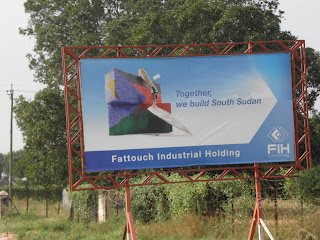 New Country, New Beginning: Take an HIV Test Today
New Country, New Beginning: Take an HIV Test TodayThree and half years, a referendum, and a new country later, I returned to South Sudan on 10 November 2011. The airport hasn't changed much. Arrivals is still in a single dingy room, where checked luggage is brought by a tractor trailer to an couple of glassless windows at the back of the room and arranged by baggage handlers onto a wooden counter. The only obvious difference I saw was the large ex-ray machine that all checked and carry-on luggage is required to pass through. This really reminded me of northern Sudan. I couldn't help but think they were checking for alcohol and then wondering why, considering its legal in the South.

I walked out of the airport and looked around the new outdoor waiting area, looking for either a familiar face or someone holding a sign with my name or organization on it. No such person appeared. Fortunately, after a few phone calls, I learned that someone I knew was on the way. My ride eventually arrived, and we headed off in IDLO's LandCruiser, the unofficial vehicle of the international aid worker.

Aside from the airport, the first thing to catch my attention on this return to Juba was a billboard with some representation of the South Sudan flag and the advice: "New country, new beginning; Take an HIV test today." This was one of many billboards I would see that used South Sudan's recent independence for marketing purposes, but it was certainly the most striking. Others were advertising mobile phone companies and contractors and government agencies. This one, however, stood out not only for it's message but also its apparent bravery at both calling attention to South Sudan's growing HIV problem and linking that problem...one that's not often talked about...to the country's greatest source of pride: it's independence.

My next ten days in Juba were mostly spent going across the Hamza Inn compound, from the IDLO office to my overpriced hotel room ($110 a night for a room that would have cost about $5-10 in many of places I used to visit in Eritrea). When I did get out, there was something new to learn or see every day. Juba, the overgrown village that I couldn't imagine being a national capitol when I visited back in 2008, is growing by leaps and bounds. I would not be surprised if three streets had been paved during my ten days in the country. I didn't recognize very much, to be honest. And even landmarks I thought I knew had relocated or changed dramatically or both. For example, AFEX, the tent city where I had stayed during my 2008 visit, is in a completely different location and is now made up of small bungalows rather than small safari tents and containers.

My time in Juba was also an opportunity for reunions. Many veterans of Darfur have ended up in South Sudan during the last couple of years, including several of my friends and colleagues from Nyala. As such, I ended up meeting up with three Darfur friends during this trip and tried to see another. In addition, while out to dinner one night with some colleagues, I couldn't help but think that one of the women at the table next to us was someone I knew from Nyala. I still think she might have been, but I can't be sure. Maybe I'll find out eventually. I'm also making plans to meet up with several other friends and acquaintances when I return to Juba at the end of January. It may not be my new country, but like the South Sudanese, I do believe I have a future in the world's youngest country!
